When Answering the Phone Means Life or Death: Inside a Suicide Call Center
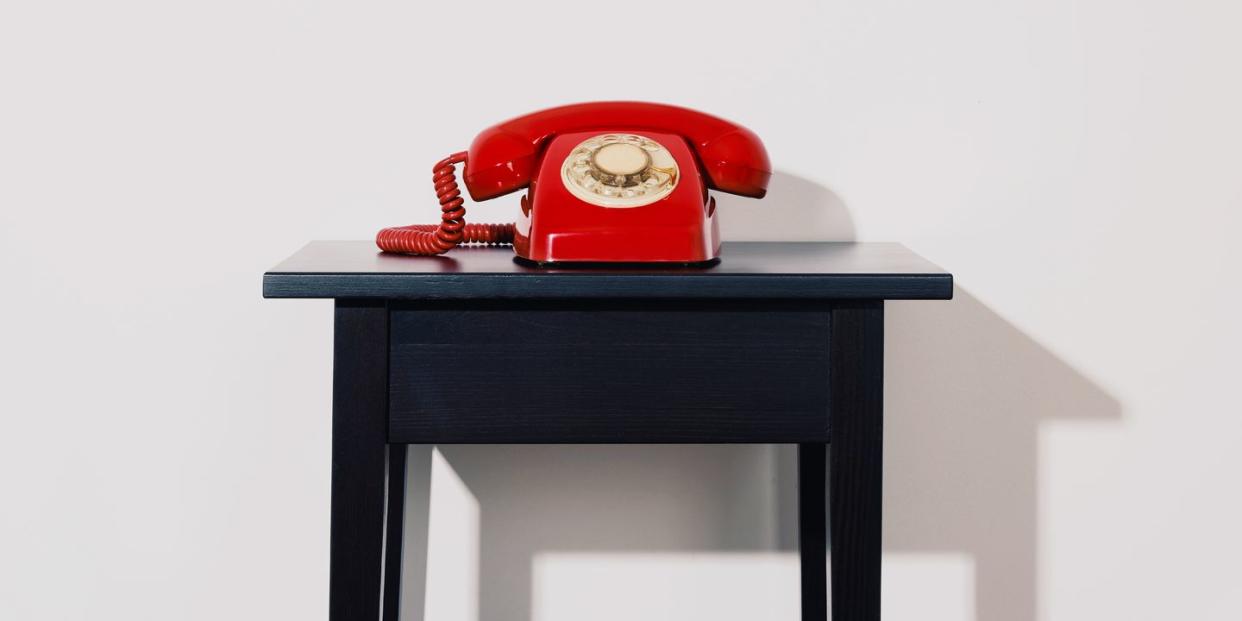
Caution: The following story contains graphic descriptions of suicide and suicidal behavior. If you or someone you know needs help, call or text the Suicide & Crisis Lifeline at 9-8-8.
“I have no desire for death;
no suicide ever had.”
—from 4.48 Psychosis, by Sarah Kane (1971-1999)
The storm came with snow and then sleet over snow and then snow over sleet. It will keep coming. More than a foot so far. Already it has bent trees over power lines and swallowed mailboxes and dragged cars off roads. Corvus had her own car towed home the other night, just before she lost power. The rooms went dark and then the water pump shut off and then the air began to chill. She hacked away ice from the car with a knife, just to make the drive the next morning, down the hill and into town for work.
She knew she would not be able to get back.
She booked a motel room, has spent the last two days there, slept little, walked to work, walked back. Tonight will be her last shift this week. She trudges to the call center once more. The snow comes up past her boots. The streets are dark now, empty of others. Two moose cross in front of her, heading, it seems, to the highway.
She arrives to the call center just before midnight. She greets a colleague seated in another office and clomps down the hallway where Christmas lights are strung along the walls. She finds her cubby. She keeps extra socks here and a microwaveable pot of soup in case she is trapped come dawn. It has happened before. The soup is for everyone. She removes her boots. She takes a pen and a notepad with the color legal paper she likes and settles into an open office. Any notes she takes she will shred before she leaves.
The office is not hers. It is not anyone’s. Shifts run long when calls run long. You take the office available. This one is plain. A desk, a standing lamp, off-white walls, mostly bare. On either side of the dark window, where the curtains are half drawn, hang lone paintings of sailboats. In them, the sky is clear, the water is calm, the shore is within reach.
On the desk, there is only a computer. And two phones. Each desk has two phones.
The first phone is for the callers. They dial the local crisis number. Or they dial the national number: the old number, 800-273-8255, or the new number, 9-8-8. Most calls are local. They go to the crisis center nearest the caller’s area code. For 907, Alaska’s code, the calls come here. But sometimes the lines are busy and the calls are routed from elsewhere. Callers dial from every state. They call from bedrooms, cars, kitchen floors. From cabins deep in the Alaskan bush where there is no Internet. From freeways that have never known snow. They call for different reasons. They call for the same reason.
Corvus logs into the computer. She pulls up a program in which the workers input notes for each call, notes that are saved, confidential. The notes help the next shift. Jack called because he was worried about his son, he may call back. Jane called because she was worried about herself, she’s been having “ideations.”
Over the last twenty-four hours there have been twenty-nine calls.
Slow, Corvus thinks.

There is little logic to the call volume, though sometimes there are patterns, seasons. Many call before the holidays. It is the time before Christmas, Corvus has found, and before New Year’s. Many call then. Lately, many have been calling for sex. They are out of work, cannot afford the five-dollar-a-minute 1-900 numbers. She remembers their voices, the men. They call compulsively. “Hello, John,” she will say. “You know the rules. I’m not going to talk to you.” (Corvus has chosen to keep her real name private for this story.)
She scrolls through the calls, looking for a specific note. There were a few hang-ups—callers who disconnect after hearing the line worker’s first words: “You’ve reached the crisis center.” Sometimes they think the line is for other things. Sometimes they are playing a joke. They are logged either way.
There was one regular, a woman who had anxiety, other issues. Regulars dial through local numbers, numbers for crisis but also just to chat. Warm lines, they are called. Some use them because they are told to use them. By therapists. By hospital staff. They call to check in. Regulars will sometimes call and hang up until the voice they recognize, the voice they want, greets them. Corvus cannot reveal to her callers the hours she works. Relationships must remain professional. But they know. They know when she is there to answer.
She sees one. A double note.
A double note means a “suicide assessment.” It is made whenever a caller uses that word. “Suicide.” It can be in any context, even as a joke, even as a tic. There is one man who calls often, when he is drunk, and each time he screams, “Kill me now! Kill me now!” Each time, Corvus logs an assessment. Once, she heard a child in the background answer. The man screamed, “Kill me!” and the child yelled, “Bang!”
She reviews the double note. The woman felt unsafe, she’d said. She was afraid of having a psychotic break. She said her neighbors were listening to her, the man downstairs all the time. She thought about hanging herself. She said she was too much of a coward to do it. The call lasted twenty-one minutes.
There is a spectrum. Some call because they are scared, for themselves, for others. Some because they feel alone. Some call because they’ve thought about doing it, this thing they cannot take back. Or because they plan on doing it. Or, maybe, because they’ve already started.

This last group is called “active suicide.” It means the suicide is in progress. It means, oftentimes, Corvus must use the second phone.
The second phone is for her.
It connects her to dispatch, then first responders. She picks up this phone when someone on the other phone needs more than her voice to save them. She holds a phone up to each ear and tries to pass a message from the first to the second. Name. Location. The second phone asks about the first. What park bench are they calling from? How many pills did they just take? What color is their jacket, their scarf, their hair? She does her best to find out. But sometimes she cannot. The first phone will hang up and then the second phone will notify first responders, and then it too will hang up.
And then Corvus will sit there in silence, until the next call.
Sometimes the second phone will ring again. Sometimes hours later. It might tell her what happened. If they found the person on the park bench. If they need more details. But that phone doesn’t call back often, and for that Corvus is grateful. Sometimes she doesn’t want to know what happened. But sometimes not knowing is the hardest part.
In that silence, some nights after she uses the second phone, she will sit there frozen. And then she will shake.
She is done reviewing the notes. She waits for a call. If she is not listening or logging, she is waiting. She brings books. Beside her are two romance novels, one a paranormal romance. She always keeps an extra in her car in case of traffic, construction, an accident.
The window behind her now is black, the moon outside concealed by clouds, the large pane turned to a dark mirror. Another storm is predicted. It will come just after New Year’s. Like the holidays, the weather, too, can create call patterns. When people are snowed in. When people feel most alone.
Corvus worked Christmas, just after the first storm. There were two active suicide calls that night. She used the second phone twice. After her shift, she drove through the storm’s wake. The car lost traction and she slid backwards through the night.
She called the tow company.
“Don’t leave me up here in the dark alone,” she had said.
A voice answered: “I’m on my way.”
She lives in a duplex out of town and into the hills, where the wind through the trees makes a roaring sound she loves, and where far off at night she can see the lambent lights of lone homes. She lives alone. She has no family left. Her mother came here once from the lower forty-eight. What she found was a daughter finally at peace. So she stayed. Her mother stayed here in Alaska for the rest of her life.
The driver took her the last two and a half miles to her home and returned her car the next day. Free of charge.
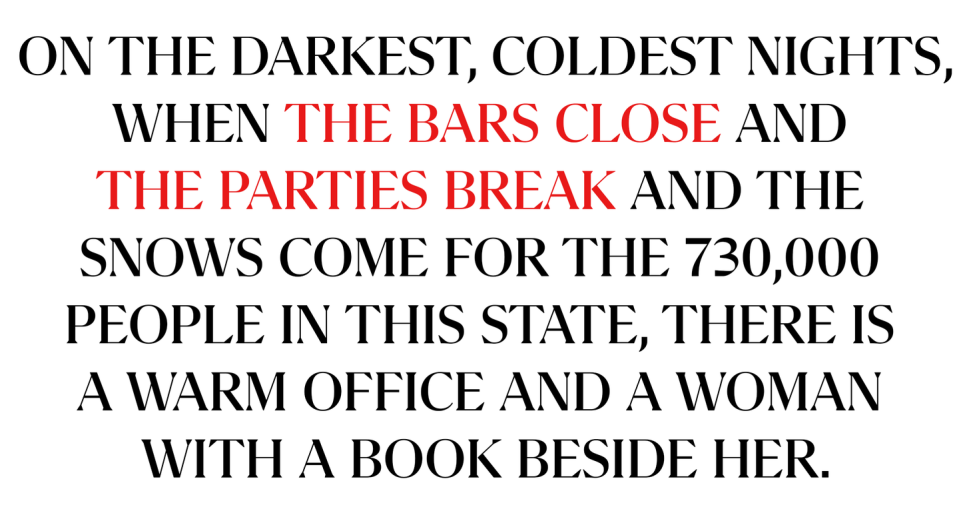
Acts like these are why Corvus has stayed, why her mother stayed. There is a kindness among those who live in these parts. She will often return home to a driveway already plowed. No note. A neighbor, perhaps. Maybe the man down the hill who has a wife and kids and who once invited Corvus, the first time they met, to come over if the storm got too bad. Perhaps these are the people calling her now late in the night. Perhaps she is returning a kindness already offered.
She puts down her book.
She thinks of the unwashed dishes on her counter. She hasn’t been home for days, just to the motel and back to work and back to the motel. She hasn’t slept much. So many are snowed in. Her coworkers aren’t able to get into town, but the phones cannot be left unattended.
At home, blackout curtains block what light filters through, though it’s not the light that keeps her up. Sleep is never easily won. She lies down at one in the afternoon. If she lies down at one, she can fall asleep by three, but sometimes it takes longer and sometimes she does not sleep at all.
It has always been like this. Her mother used to find Corvus awake in the crib at night when she was a baby. A lifetime later, it was Corvus who would watch her mother sleep. In the hospital bed, sometimes hallucinating. Then, with a belt tied around her mother’s robe and bound to her own wrist, so she could lie beside her and know she was safe. Here in Alaska. The hospital bed in the den, the waterbed in the bedroom.
Waking is easier than sleeping. Still, she sets alarms. She doesn’t drink coffee. She simply wakes and gathers her things. She does not change her habits on days off. Her life is the same as everyone’s, she thinks, just upside down. The morning is the time for going out. Shopping. “Dinner” with friends. And then home at noon for bed, the sun climbing to its meridian once more. Morning and night can be confusing this far north. Some days, the sun never sets. In other months, it barely rises. It is not uncommon to forget. Not uncommon for someone to arrive at church and find the pews empty, having come twelve hours early.
She looks above her desk to a board where a list of line workers is pinned.
They have fourteen on call. Only six are full-time, Corvus one of them. Most states have two, three, four call centers. In Alaska there is only one. In all 663,300 square miles. This call center. Most nights, Corvus is alone here. Which means most nights, on the darkest, coldest nights, when the bars close and the parties break and the snows come for the 730,000 people in this state, there is a warm office and a woman with a book beside her.
If a call comes and she is already on the phone, the call goes to another state. Sometimes, it waits in line.
She doesn’t expect relief to come by morning. It may be more than a dozen hours before anyone arrives.
The first phone rings.
It is a soft clanging sound, the ring, almost like a child striking a xylophone.
Corvus picks up.
“Hello, you’ve reached the crisis line,” she begins. “This is Christine.”
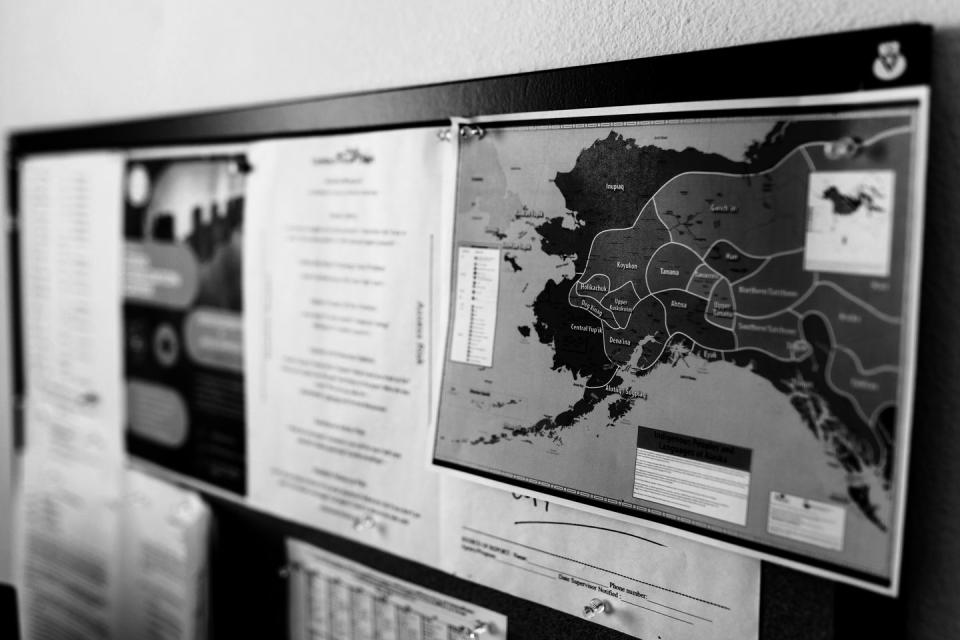
They use pseudonyms. Distance must be kept, relationships forbidden. A caller may want to know about her life, call her back, keep calling. Many callers are harmless, but one never knows. The town is small. Alaska, too. Run-ins happen. Some of her colleagues have seen callers out in the world, by chance. On a bench waiting for the bus, a voice a line worker recognizes from a call last month. Or years after working the line, a voice overheard at a clinic conjures a violent life story told on the line late one night.
A woman’s voice comes through the phone.
It is young, panicked. Something about a house and snow and a car. About being trapped.
“Okay, slow down,” Corvus says “It’s all right.”
Her voice is calm. She tells people this calmness is what she does for work, that she is a “professional calmer.” She cannot tell people what she really does. The official title is “crisis intervention specialist,” though many just say “crisis line worker.” It feels less formal that way. The line is what they work, and they will talk about “the line” as though it is the office. They will say things like I’m working the line tonight. Or My mother used to work the line.
“Are you in a safe place?” Corvus asks the caller.
She asks a lot of open-ended questions.
What is making you feel unsafe? Can you tell me about what’s going on?
If a number is shown on caller ID, she can check it in the computerized database. She skims quickly as she listens, looking for essentials. Have they called before? How long did the call last? Was there a double note, a suicide assessment? She must always consider this risk first. From there, she must learn other things. Does the caller have a plan? Has the plan begun? Are there “heartstrings”—reasons for a caller to live? Children, spouse, tribal elders? She can use these to talk them down, to save them. Finally, she tries to learn location. How they can be reached, if they begin the suicide. These details are for the second phone.
Sometimes, they are all that matter.
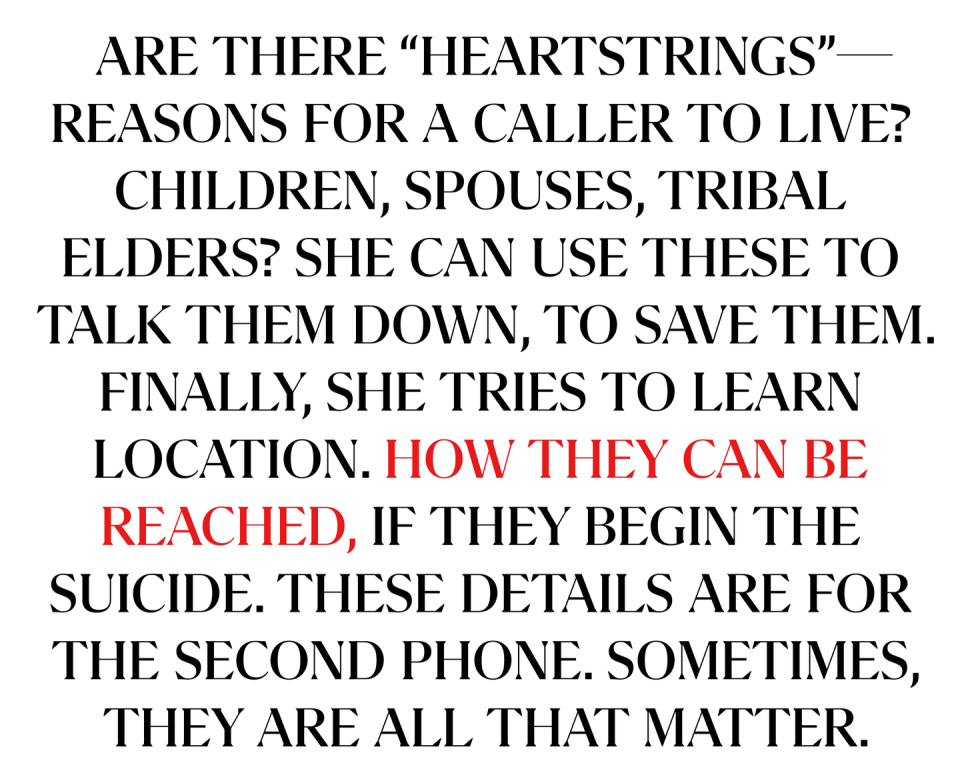
The calls are like so many accounts of the world, Corvus thinks. They mark events, moments of destabilization, personal and global. Hurricanes, storms, elections, disease. When the pandemic spread, the calls came from hospitals, callers alone, callers wanting to hear one more voice before the end. Some were nurses. “He just died in my arms.” One death too many. When tanks rolled across the Ukrainian border and planes dropped bombs on homes, the calls came. The bombs will not land on homes here, but people here will call anyway, worried that the bombs will come. The calls surge, Corvus notices, when the world loses control, when the callers lose control over their worlds. For some, it does not take much. A beloved celebrity rushing the stage to strike another beloved celebrity—a call came because of that. A post on social media. Depictions of a hopeless earth. Climate change. A Supreme Court decision. Many came because of these.
“Are you in a safe place?”
“Yeah!” the young woman replies, sounding annoyed.
She continues, rapidly. She is in a house far from town where the snows have trapped people inside. She was supposed to be plowed out yesterday but the plows never came. She only had a few days’ worth of anxiety medication, one a trial drug, available only in town. She has run out.
Corvus listens. She does not interrupt to ask questions, only to soothe the woman. She knows the woman is having a panic attack. She must find a way to give the woman control.
She imagines the woman alone in the dark. Corvus gets many calls like this. In Alaska, there are communities only sled dogs can reach. Communities without cell service, without Internet, without medical care. Places where groceries are delivered by plane and doctors by boat. If the second phone is used, a state trooper might need to use a plane. Sometimes there’s nowhere to land. They will fly over in an attempt to determine whether a caller outdoors is still moving, still alive. Corvus remembers a man one winter calling from a cabin. He was not suicidal, but he was going to die. You get reports here when the cold and the wind come in. It drops to minus-fifty sometimes. To be outside for too long, or to be inside without heat—it does not take much. Fifteen minutes. The man had used all his food, all his firewood. He was getting weak. She stayed on the phone with him until the end.
The woman says it is not her house. She is house-sitting. She says the home has a snow blower but she does not know how to start it.
Corvus thinks of a blower she once lent to a neighbor. He told her it was so confusing he had to Google instructions. Every year she too has to remember the order of buttons and levers.
“Have you thought of Googling instructions?” Corvus suggests.
The woman had not.
Corvus helps her find the model, search the Internet for a video.
As the instructions appear, the woman begins to calm down, the conversation placates.
It is the effect Corvus has on others. She likes to listen. She makes friends easily. In training she was told to reveal to callers only as much as she would online at Oscar Mayer. But in this town one can hear a whole life’s story in a grocery line. Corvus talks to the flagger by the roadside, the cashier at the store, the butcher. She asks about their lives. “You’re so nice,” they’ll say. “People have been yelling at me all day.”
“There’s another thing you can do,” Corvus continues, hoping to give the woman more control. This is the goal of every conversation, what a counselor must always try to do: give the caller control.
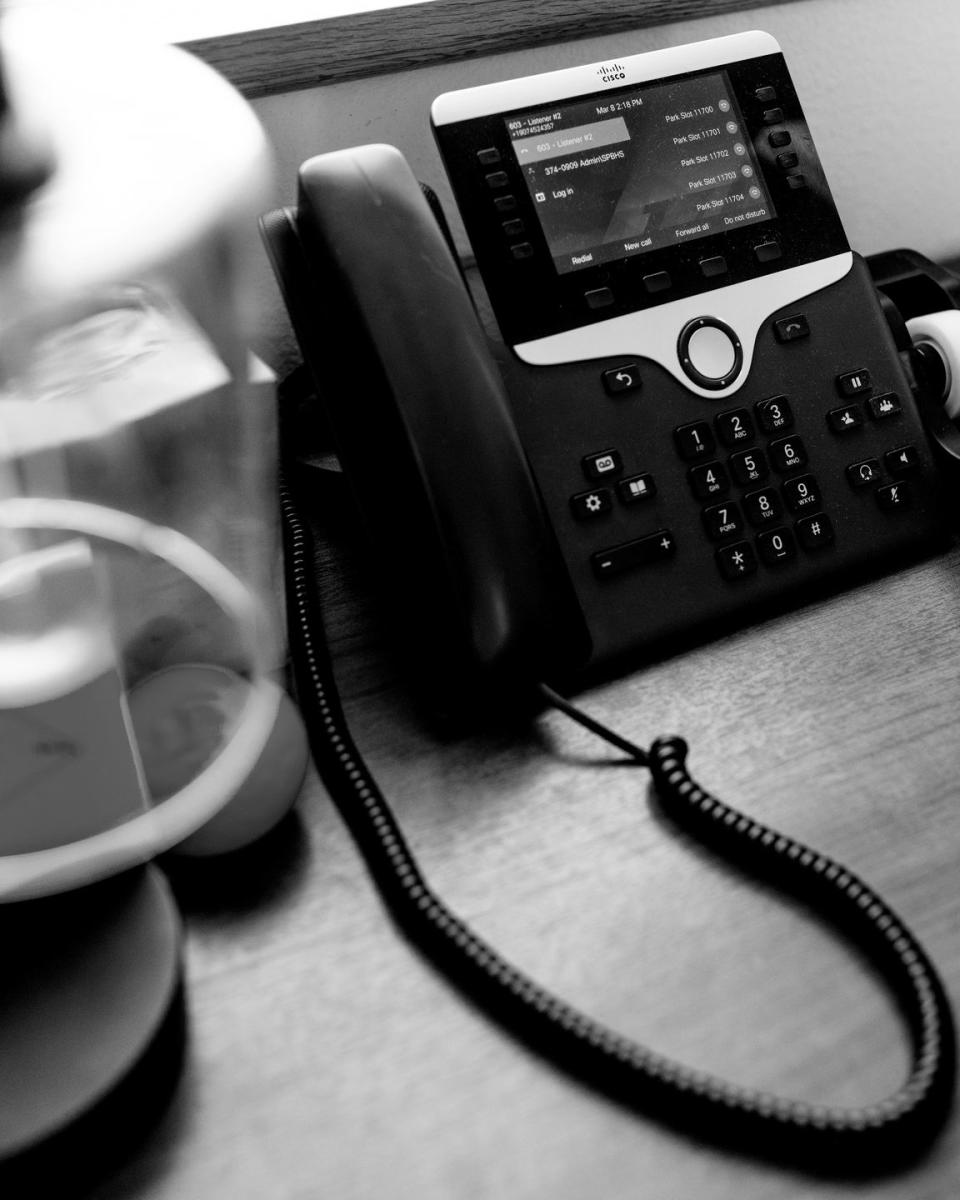
Her mother used to do the same for her. When Corvus was starting out in life. She would call her mother for advice, and her mother would turn it around on her and ask, “What do you want to do?” She would give Corvus the power to make choices. Life was different then. Life was silk, high heels, long fingernails, and manicures. Life was corner offices and skyscrapers towering over the Hudson and apartment rooms above Lincoln Center. Life was making money. And going out. And meeting people. Actors and artists and directors. It was a long time ago.
She was twenty-three when she made the most desperate call. A crisis, not unlike so many she hears now. Even then, her mother said, “What do you want to do?” She thinks of her mother now: When she came to live with Corvus in Alaska, she was on a trial medication for the cancer. Corvus would have the pills shipped to the pharmacy in town. She gets an idea.
“When the pharmacies open,” she says to the woman, “you can call and talk to a pharmacist, see what they can do.”
The woman says she will. She is calmer now.
She has a plan.
Corvus puts the first phone down and begins to log the details.
She likes to end calls by saying there is always someone by the phone. Even during a storm, the call center must stay open. It is not like this everywhere. Corvus remembers when the call centers in New York City closed during a hurricane.
One night, a call was routed to her from Guam. They are the hardest calls, the out-of-states. Corvus does not like them. She knows nothing about local resources, the health-care offices, the clinic closest to the caller, the shelter they can escape to if their partner has been drinking, has been hitting. If Corvus has to use the second phone, it is more difficult, because there is no single number she can dial to reach the local first responders—you cannot just dial the area code and then 9-1-1. You have to dial longer codes, and you have to look these up during the call, sometimes in the middle of a suicide. Sometimes she will call dispatch only to hear an answering machine. The department is closed, or busy. “Please hold; we’re processing your call in the order received.” An automated message for a 9-1-1 line. She once waited on hold with the second phone, the caller on the first having just slit their wrists.
She types her notes into the computer. She uses the same formula, three paragraphs. The problem, the assistance, the outcome. Every call.
Corvus has taken calls from almost every state. She’s had suicides call from freeways in Los Angeles. The saving grace in Los Angeles, she tells people, is gridlock. It’s hard to drive off the road and kill yourself when you’re staring at someone’s bumper.
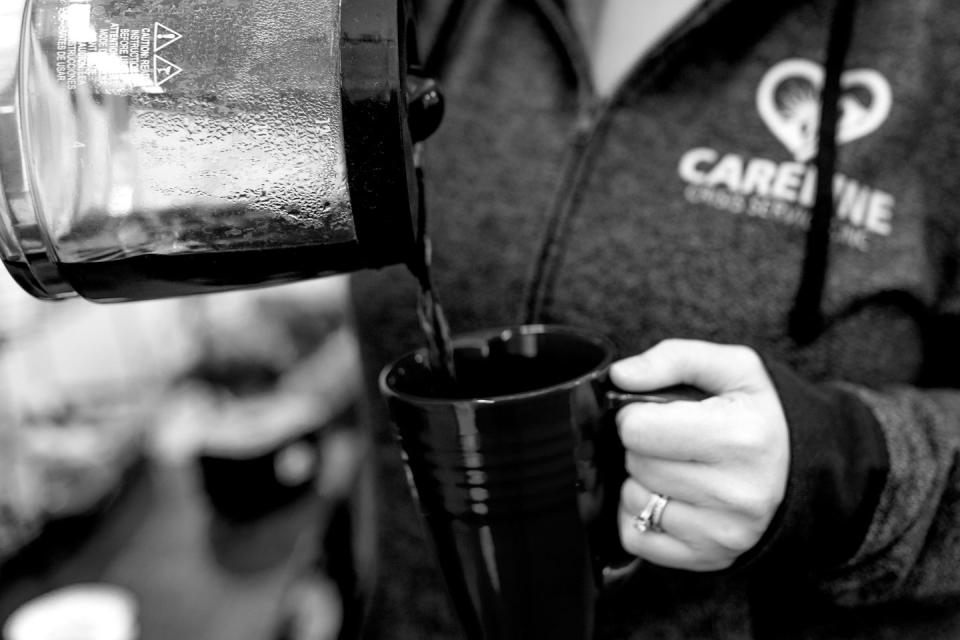
Her humor is disarming. But you have to have a sense of humor to work a job like this. Some of the nurses from the local health clinic have one. When they refer a patient, they dial Corvus to let her know the call is coming. Before they hang up, they will sometimes say, “Good luck!” and then laugh maniacally through the receiver.
Corvus wheels her chair to the window by the sailboat paintings, in which the waters are always calm. Beneath, she finds more reading, this time a large printed packet. “Expanding the Evidence Base for Crisis Care Continuum, Call Centers, Mobile Teams and Stabilization Units.” An online learning course for clinicians offered by the American Psychiatric Association. She takes many such classes. She wants to stay up to date on best practices. Schizophrenia, the misdiagnosis of minorities, depression in older adults, communicating with those who have been incarcerated.
She will do this often, take classes, think about work. It is so much of her life now, she realizes. Her work and her books. She is a reader and a collector of things to read. She has been searching for primary sources lately—letters. Specifically, she is looking for the love letters between James Joyce and Nora Barnacle. Her mother got her started on first editions. She had been a history teacher, and though Corvus never cared for history, she took a history class in college and got an A, just to show her mother she could. She was more interested in numbers, systems. She studied advanced mathematics and computer science. She later taught these as a college professor. But again, that was another life.
That was before it happened, the thing that happened to her in New York that changed everything.
“Hello, you’ve reached the crisis line.”
A man’s voice. It sounds young, maybe teenage, maybe college age, early twenties. It trembles.
“Does temperance ... mean sober?” the voice asks.
It is an unusual question. An intellectual question. Corvus will usually respond in kind. You take the conversation where the caller wants it to go. You answer honestly. They will know when you lie.
“No,” Corvus begins thoughtfully. “Temperance does not necessarily mean sober.”
She was an addiction counselor once. She thinks of the many drinkers she has known. She seldom drinks now, because of them. She remembers her first drink with her mother when she was fourteen. Her mother would let her try anything, so long as she was there.
“By definition, if you are being temperate, you are not imbibing at all,” she goes on. “Whereas sobriety means you are not taking it to the point of impairment.”
The man continues on, his voice high and thin. She can feel it shaking. Something is off. There are certain times, certain windows in the night, when callers seem to be at higher risk. Three A.M. is one of those times. The devil’s hour. When one leaves the bars. When sleep refuses to come. When thoughts creep instead.
He tells her he has depression. He tells her he has been depressed for years. He uses the word:
“Suicide.”
He says he has tried before.
She listens, and then when she can, she asks.
“Are you in a safe place?”
And then, when she can, she asks:
“Are you having thoughts of suicide tonight?”
Corvus has always found it hard to use these phrases. Kill yourself is especially hard. Have you thought about killing yourself? Tonight, did you try to kill yourself? When she was an in-person counselor, she would never speak like this, because she had time, and the people couldn’t hang up. Over the phone, she has to be direct. She has to make it real for the callers. They must understand what they are planning to do.
“I’m not going to kill myself now,” the young man says eventually.
They have been talking for more than twenty minutes. The “now” tells Corvus that before he was undecided. Perhaps he had tried.
She does not need to ask to know about the depression. It is often like this with depression, Corvus knows. In depression, kill yourself is background noise. It plays every day. And one makes the choice every day, maybe several times each day, not to listen. But it plays nonetheless. It might play forever. And it can start early. One caller once told Corvus they knew when they were a kid. They said it started at age three.
Corvus does not ask the young man about the depression, but she does use the phrase: “background noise.”
He understands immediately.
He says the depression has been around since he was a boy. It has gotten better, these last five years, but it has never left. He says tonight he has been drinking. He says he is drunk. But Corvus also knows this. A depressed person will chase the noise with booze. It depresses further, of course. But sometimes, it builds courage. It is why suicide rates are high in places where drinking is too. All the vulnerable might need is that extra push. Corvus has been to such places. Many are in the villages, the tribal communities, where addiction is high, poverty, remoteness, where you would need a snowmobile or a pack of sled dogs to reach someone. The suicide rates are highest in these tribal communities. Highest in Alaska. Highest in the country.
“Okay, what’s going on right now?” she asks.
She will repeat these kinds of questions. Calmly. Kindly.
What is happening right now? How are you?
She tries not to ask “why” questions. What matters is tonight.
The young man says today is the anniversary of his grandmother’s death. It was not long ago.

Corvus calls these red-letter dates, when the depression worsens, when the background noises louden. He would know these dates, Corvus imagines. She imagines him writing down this phone number, having it ready tonight. Before he started drinking. Before the noise took over.
Corvus has a heartstring now. She can return to the grandmother if she has to. If she has to talk him down again.
What would your grandma think? What would she say if you did this?
She will use anything. Anything to save him.
She has not looked at the second phone yet. The young man is not an active suicide. Still, alcohol persuades. She cannot risk distraction. She must build trust. Some callers know when you are only half paying attention. They know when you have picked up the second phone.
She asks about his grandmother.
What are you feeling? Tell me about her.
He talks. She listens. Mostly her job is silence, she has come to learn.
Occasionally she gives feedback.
Sounds like you really loved her. Sounds like she really cared about you.
Occasionally, she asks him questions.
Have you had anything to eat today? Are you warm? Are you taking care of yourself?
She is looking for a sign that the background noise is quieting. That he will look after himself. Stop drinking for the night. Stop thinking about the noise. That he will make plans for tomorrow. Making plans is a sign of safety.
After a while, the young man’s voice grows stronger, less reedy. He calms. He makes reassurances.
“I’m okay now.”
Then: “I’m going to stop drinking.”
And then, offhandedly, he adds:
“I think I’ll meet up with some friends later.”
These things tell Corvus the young man is safe. At least for tonight. You do not speak of the future if you plan to die.
The office is silent again. Her colleague down the hall has already gone home. Corvus is alone.
Some nights after a call, she will walk. Back and forth down the hallway where the Christmas lights now hang. During some walks she is crying, her body shivering. She walks and tries to calm herself. She walked for half an hour recently. Her mind had wandered. She had lost track of everything.
She was living in Manhattan when it happened.
She did not give consent.
She called her mother.
As always, her mother would not choose for her. She would listen. She would give Corvus the power. She would give her the choice.
“What do you want to do?”
Corvus wanted to come home.
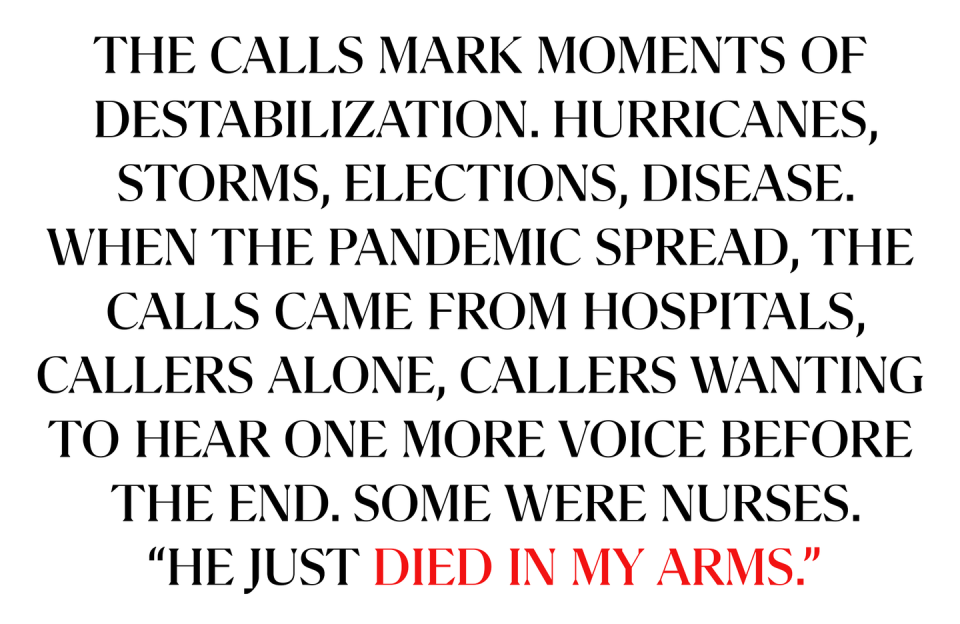
She later married, later divorced, lived again with her mother. She worked at a bookstore in the mall. One day she was coming home with her mother when a man came up behind her and put a gun to her head and another man came up in front and put a gun to her chest. They robbed her. Pistol-whipped her. But her mother was safe.
“What do you want to do?”
She wanted to live without letting these crises define her. It was time to leave home again. She chose Alaska. She left on Christmas 1985.
Corvus stayed in Alaska for many months. Finally, she had her adventure. Voyage to the unknown. An airstrip marked on a frozen lake with spruce boughs. Sled dogs. Bread in a woodstove and a moose carcass frozen on the roof. An apartment in town. And then jobs. A ticket collector at a comedy club and a cocktail waitress and a hostess and, once again, a professor.
On a visit home, her mother gave her the news. She was sick, she said. She had stage-four breast cancer.
Corvus asked her, “What do you want to do?”
Her mother wanted to live as if she were not dying. With her daughter. In Alaska.
They lived in town. The hospital bed in the den, the waterbed in the bedroom. For two years. Chemotherapy and trips to the drugstore and injections and getting by. By the end she was struggling. She was broke paying for the medication. She was running herself down. And then, after two years, the next crisis.
After two years, Corvus had a stroke. She was rushed to the hospital. Bedridden. She could not spell, could not recognize words, could not remember events. Her mother needed care she could no longer provide. Corvus moved her to adult housing but was unable to visit the facility herself because she couldn’t leave the hospital.
Six weeks later, her mother was dead.
Corvus had made the wrong choice, she thought. The facility was bad. Her mother had fallen.
She could not save her.
“How did it end?”
“What did I do?”
Nothing.
It was her fault.
She was alone after. She was out of work. She could not pay rent. Some movers took her possessions and then she had nowhere to go. She would later call this time after her mother’s death “the crack-up.” Like Fitzgerald and Salinger and Plath and so many characters she had read about over the years. She too had come to a foreign place. Like them, that place had crashed over her.
She was homeless and hadn’t eaten for a week when she walked into the rescue mission at three A.M.
She was forty-two.
Life is waves around a boat. No sea is always calm. No life is ever wholly intact.
One day, she saw another resident studying for the GED. Corvus began helping as best she could. Teaching was an instinct. When they saw her teaching, the people who ran the mission asked if she could work a few hours as a receptionist. Then, when they saw her sorting receipts, they went further, asked if she would like a job. “I don’t remember your name,” she said to the man who offered. “That’s okay,” he said. “It will come.”
She became a counselor.
She worked for fourteen years.
She was retired from counseling for a week and then decided she wanted to start over again.

She is the last, that she knows, of her family. What she has left of them are artifacts. A birth certificate. A blanket. A picture of her great-great-grandfather. His father was a white man—his owner and his mother’s owner. His father claimed ownership of every son he forced her to have, and they carried his last name. And so Corvus’s great-great-grandfather was born to him enslaved and carried his name. She is the last member, that she knows, of this family. A family of teachers and statesmen and counselors. And a line worker.
(She sometimes jokes that she could be a sex-line worker in her next career. She hears that grandmas do it. She is, after all, always looking for something new.)
She has been trying to limit movement and exercise. A few months from now, she will start to feel trouble in her heart. She will get light-headed. Her chest will pound. Sometimes she will faint. The doctors won’t know what it is. The tests will show nothing. The job will provide no relief. It will happen one night while she is on shift. She will pass out between calls.
Once, it will happen when she is here alone. One of those nights when she goes to exercise her body after a call. She will be on a walk and then all of a sudden she will be on the floor. Her heart rate will jump and her blood pressure will fall and for thirteen minutes she will be unconscious. She will see a brightness. A sidewalk cafe. The lights blinding. Everything sparkling. A place unlike any she has ever seen. She has been to many places in Europe with her mother, many places with such cafes, but she will not recognize this one. It will feel real. It will feel more real than any dream she has ever dreamed. And then she will awaken.
She does not know if she believes. If the people she has lost are still with her, somewhere. If she will see them again, hear them again. She would like to come back, though. She would like to be a ghost after, her final career. To stick around and help others without them seeing, without them ever knowing.
“Hello, you’ve reached the crisis line. This is—”
A woman is crying.
Corvus can hear the rattle of a pill bottle, the gurgle of a drink being swallowed.
Immediately the woman says, “I’m going to kill myself.”
There is I want to kill myself. It sometimes means I’m going to kill myself. But not always. It could mean the caller can be talked down. I’m going to kill myself requires a different approach. There is no need to ask the standard questions: Have you thought about it? Do you have a plan? The thoughts have been acted on. The plan is in motion.
“I don’t want to be here anymore,” the woman sobs. “I don’t want to exist.”
Already, Corvus is reaching for the second phone. It will be a balancing act. How she moves from the woman on the first to dispatch on the second. The phones in both hands, the second brought closer, the first farther away, so the caller cannot hear. The dispatchers know by now how to feed her questions. Find out the street name, they will say. Which home? What car parked out front?
What has she taken? How much time has already passed? There are details Corvus needs to know quickly. But she cannot ask too strongly. She has to be conversational.
“I understand, you’re upset,” she says soothingly. “Have you taken anything before you started the call?”
“Pills.”
“Okay. Do you know how much you’ve had? Can you tell me what you’ve had?”
Silence.
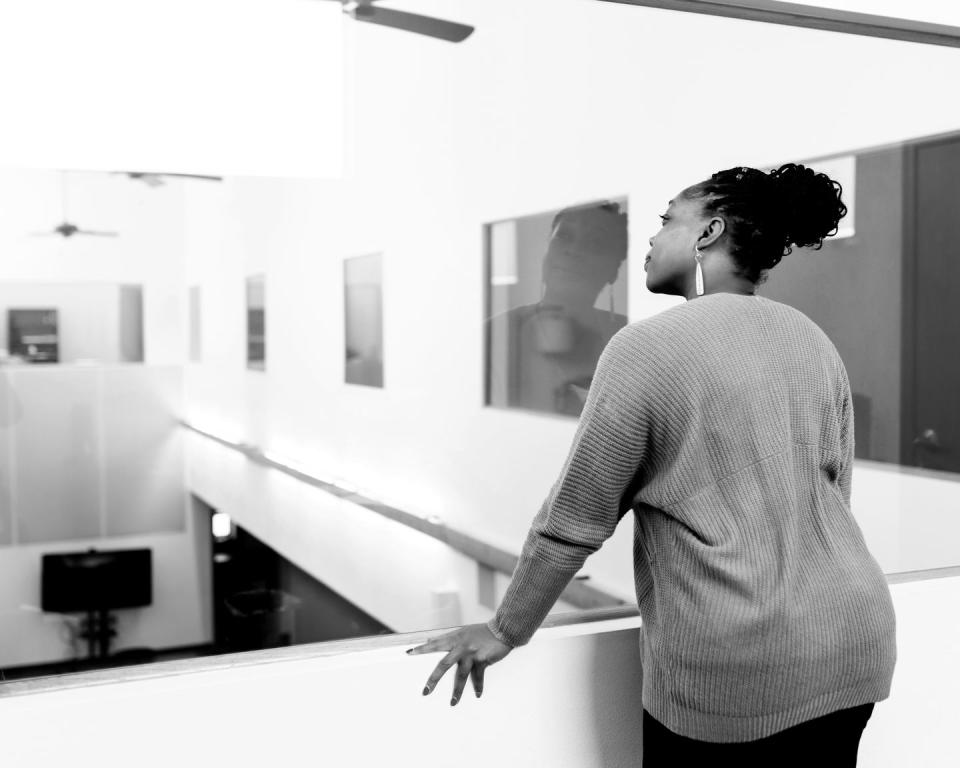
She has pushed too hard. Just before Christmas, Corvus had a similar call, a woman high and drunk, an active suicide. The woman had hung up. She had said she was in her bedroom. Police later said she had dialed from a dog park. They called Corvus back on the second phone asking for something, anything. A hint. A sound heard in the background that might reveal her location. They couldn’t find her. They still haven’t.
Corvus knows it is the caller who makes the decision, the caller who decides to kill themself. It is not her fault, Corvus reminds herself.
“So what has led you to make this decision?” Corvus asks, backtracking.
The woman begins talking about when it started, the depression. She says she was raped. It happened at thirteen, she says. She blames herself.
“I screwed up.”
She repeats this.
“I screwed up.”
But she’s too intoxicated. Corvus cannot make sense of her next words.
The woman mentions “children.” It could be a heartstring, a reason to stay alive. Corvus will use anything. She will describe the mess a suicide leaves. Children who find the body. She will plead.
“Okay. How do you think they will feel?” Corvus asks.
“They’ll be better off without me,” the woman says. “They’ll get over it.”
They’ll be better off without me.
They’ll get over it.
Corvus hears these lines all the time.
As she talks, she searches for the woman’s number in her computer. The woman has called before. The computer shows her first and last names. A note written by a previous line worker lists her town. There is also a double note, a suicide assessment. This is not her first time.
“My father committed suicide,” the woman says after a time.
“It runs in families,” Corvus says.
“No, it does not,” the woman answers forcefully.
“Did you know,” Corvus continues calmly, “that your children, the children of a suicide, are twice as likely to commit suicide themselves?”
The woman does not answer right away. Then: “I did not know that,” she says.
Corvus has bought time. She checks a chart above her desk for the right jurisdiction number, the troopers she will call when she can. The second phone is still in her hand.
“It doesn’t matter,” the woman says again.
They’ll be better off without me.
They’ll get over it.
The woman takes the conversation in circles. There is no logic. She steers Corvus from one topic to the next. Corvus allows herself to be steered. You have to go where the caller goes. At least, sometimes.
Eventually, Corvus manages to work back to the pills.
“Do you know what you have taken?”
“Prescription.”
“And what pills were those?”
“I’m not going to tell you.”
If she has taken sleeping pills, she will start to slur. Some medications, like Ambien, Corvus knows, she may start to vomit. The body purges. It naturally tries to save itself.
They keep talking. More circles. The woman knows the game. She has dealt with police before. She will give Corvus as little information as she can.
After a time, the woman, still drunk, still high, but not yet sleepy, makes a pronouncement.
“Oh,” she says. “And I have a gun.”
She says it almost in a singsong voice.
Oh. And I have a gun.
Corvus loosens her grip on the second phone. She cannot risk calling now. She cannot risk the woman knowing.
Where is the gun? Do you have it to your head? Is it loaded? She needs to ask a new series of questions. A gun changes things. It could mean a different plan. Suicide by cop, perhaps. Corvus has to think about them now. When she was a counselor, she would notify police when clients skipped parole, when they were armed. State troopers pulled Corvus out of a job training once to thank her. They said the man had “cop-killer bullets.” They said if they hadn’t known he was armed, they would have gone through the front door.
“You know, I could play Russian roulette,” the woman says.
“That’s messy,” Corvus says, thinking quickly.
No one pictures what happens when you shoot yourself. You have to make it real for them, Corvus knows. They must understand consequences.
“Who’s going to clean it up?” Corvus asks.
She wants the woman to imagine her son finding her corpse.
The woman does not care.
They’ll get over it. They’ll be better off without me.
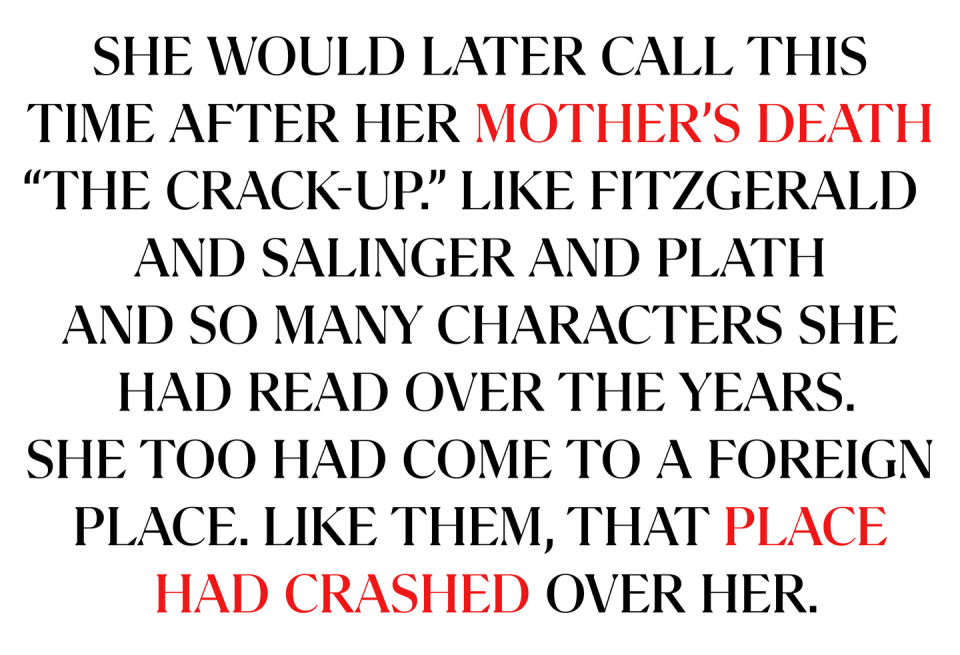
The woman changes the topic again. Around in circles they go. Corvus has to get back to the gun. She has not heard the gun yet. She does not know if the woman is holding it, where it is. Corvus has never heard a gun go off before, but she has heard the slide, the loading of an automatic. Cle-chinkkkk. The man was playing with it, he had told her.
Corvus hears the pill bottle again. She can hear the woman swallowing liquid.
“I screwed up.”
The woman is making less sense.
Corvus is desperate.
She will do anything.
She will cry with this woman, plead with her, beg her to stop.
Anything.
She has been there. At three A.M. At the doors of a shelter. She came back from it. There is always a choice.
She knows what it’s like. More than this woman realizes. Corvus knows what it’s like to have the waves crash in. What it’s like to live with background noise. What it’s like to be alone.
To be homeless.
To have a man do things against her will.
To have a gun put to her head.
To break.
She listens as the woman takes more pills. And then—
There is a click.
Silence.
The call lasted thirty minutes and ten seconds.
Hours later, the second phone rings.
You Might Also Like

